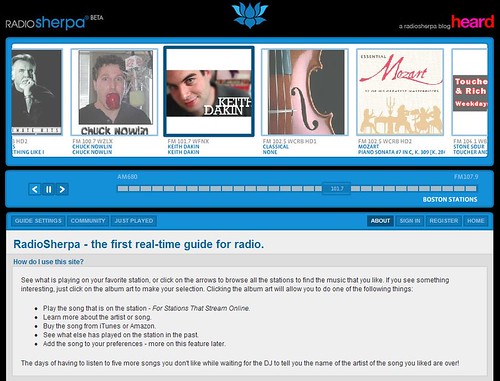OK, radio isn’t really killing video :)
A few days ago, I was introduced to RadioSherpa, a very interesting intersection between broadcast radio and the web. The service is the product of two MIT Media Lab graduates, Sasha Javid and Deva Seetharam; incidentally, Deva is one of the architects of the open source cellphone movement.
RadioSherpa presents users with a real-time carousel of tracks currently playing on radio stations in the Boston area. Clicking a ‘now playing’ track can either start playing a stream, bring up more information about the artist, song or station, add the track to a personal profile or click through to a purchase from Amazon or iTunes. Unfortunately, the service is currently limited to Boston, with plans to expand to New York and Los Angeles. Interestingly, RadioSherpa has been offering content from HD Radio stations too, giving US listeners a chance to experience HD before investing in a receiver. This is a useful lever to drive HD adoption, given upcoming problems with the evolution of DAB in the UK.

Though RadioSherpa is outside the ‘jurisdiction’ of TechCrunch UK, there are some important and compelling reasons why services like RadioSherpa, aggregating and personalising radio content and metadata, are particularly relevant to the UK.
Radio is characterised by the BBC as a re-emerging technology, one that is experiencing somewhat of a renaissance in Britain with recent Ofcom reports confirming that listening figures are rising past those of TV – and a sizable mindshare amongst Brits. Here are some facts from the BBC’s R&Mi team…
- 90% reach – almost ubiquitous.
- 10 national networks – much less fragmented than the US.
- 32.5m listeners, averaging 24 hours of listening each week.
- More than 76’000 hours of programming from 2003-04.
- Multiple digital platforms – DAB, internet, digital TV.
Indeed, R&Mi’s work with the BBC’s radio content, such as the Ten-Hour Takeover, has been at the cutting edge of convergence; moving broadcast radio to a more social medium with SMS, email and the web as rich-return paths. It’s no coincidence that the BBC is seeking to bring DAB to the iPod.
Radio favours the attention contrained nature of most digital consumers as well as a natural ‘soft’ convergence of various media (rather than the contrived multiplay options from UK telcos). Its ubiquity and relative market cohesion in the UK presents a compelling opportunity for startups that can aggregate content, metadata and communities into compelling new experiences, perhaps notably for emerging widget platforms.
To harness this potential, the UK radio industry would do well to adopt the posture of a platform business, in the same vein as Amazon, Google or eBay. Such platforms, openly offering content and metadata, could then kickstart a wave of innovation in radio communities, personalised listening, eCommerce and advertising. Drven by favourable usage trends, this can only add value to radio platforms. Something that would really help, is a web API for Freeview, providing developers and prosumers with access, at the very least, to EPG data – perhaps even media!
I’m aware of one company in the UK, seeking to do something similar to RadioSherpa…but I’m not allowed to talk about them yet ;)